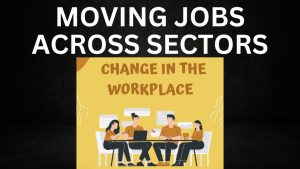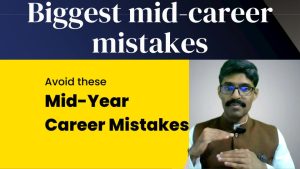The Insider Guide to Careers
Insider information, secrets and tips about getting hired and building careers. For employees and job candidates.
I conducted a resume prep workshop today to help students prepare for their first jobs. The one common question I got was how to choose a career. Should it necessarily be in Computer Science, especially in AI or ML?
The honest answer is that nobody knows. No one can prognosticate about a future that isn’t here yet. In the 1980s, Superconductivity was the Holy Grail; in the early 2000s, it was Nanotechnology. No doubt, all these technologies made changes to human lives, but not to the revolutionary extent it was initially touted. One problem for researchers is to avoid chasing a fad as a career, as fads always come in and out of fashion. Their challenge is to focus on areas in which they are genuinely passionate, even if it is non-glamorous, and hope that things will change in that space within one or two decades. Therefore, even if one enters a doctoral program targeting a hot topic, within six years of working on a Ph.D., the area may not be that hot anymore. Hence don’t always make career choices based on the present to plan for your future. The world keeps moving on all the time.
For the jobs of the future, more than hardcore technical skills, one needs to develop transferable skills. Predominantly, transferable skills are business skills and people skills. Since leadership skills and communication fall under people interaction, I will continue to refer to them as people skills. The one’s I would recommend are:
1) Communication skills
2) Learning agility or learning on the fly
3) Personal influence networks
4) Critical thinking skills
Let us get into the details.
1) The most critical transferrable skill to develop today is “verbal communication”. The human mind will always be ahead of automation when it comes to original pioneering ideas and being able to convince other human beings. Generative AI works by rearranging existing derivative human knowledge and hence is in no position to create original or new knowledge for humans. If AI generates that predictive ability, it has to mimic the human mind and billions of human minds working together. It may even need to model all of the earth and maybe even all human interactions to master that space. At least, this generation can say that AI is quite some time away. For any work that involves human interaction, one has to learn to manage resources and deal with people. Increasingly, Multi-National-Companies (MNCs) have converted people worldwide into one global village. The ability to convince and explain has never been in greater need. Written communication is also important to express your ideas in words, but talking effectively is a more valuable skill in a world of short attention spans.
2) The second important skill is “learning agility” – the ability to deal with a situation despite incomplete information. There is a certain amount of “dealing with uncertainty” here. The world of the future will deliver unique challenges, the stuff we have never seen before. The periodic rehauling of work will cause turbulence and fierce headwinds. While the turbulence will upturn the lives of many, simultaneously, a new guard will emerge who is not just comfortable with change but also relish it.
One example to think about is the emergence of AI. AI is a technology that has existed since the 1950s. The late emergence was because the market was not ready, and the technology ecosystem needed to be in place. Now that AI has emerged, it enables changes across sectors we never thought would change. It is impacting human knowledge by replacing rote learning and even stopping outsourcing low-skilled jobs to poorer countries. Chegg learned this the hard way when their customers began flocking to Chat GPT. These are just the first set of changes. There is a mind-boggling array of mind-numbing jobs we keep doing, and we never ask the question why. It is this work that will be steadily replaced by automation. Bill Gates predicted recently that AI would help Microsoft’s business finish off Amazon, as our mindless search for Amazon retail products would quickly come to an end when AI learns about our preferences. These forecasts don’t mean everyone should learn Computer Science and AI. It means that one should have a fair idea of how to apply the concepts of AI to unfamiliar situations. Any average coder can implement an AI solution when the problem is defined. The winners will be the ones who can apply known solutions to unfamiliar situations, which is not something that software engineers are good at.
Two days back, I was talking to a bunch of faculty heading placements and career development at IIT Madras, arguably the top engineering school in India. This is part of an ongoing conversation Careerbolt has been having with more than a dozen IIT’s. Universities especially the IIT’s are doing a great job imparting technical skills based on coursework. They struggle with all the other soft skills. When it comes to business and people skills, universities have no little to no idea on how they can customize their curriculum to individuals with different skill gaps. Universities need help. Since India supplies software manpower to the world, the situation at IIT Madras pretty much reflects issues in the best schools worldwide. Universities are the places where adult learners will approach for reskilling. The sooner that universities recognize the problem and customize their upskilling opportunities, the better the solutions that will emerge for students today and adult learners tomorrow.
It is not all gloom though. The Professors and I discussed where the most significant learning opportunities resided. Instead of unthinkingly choosing Computer Science as the hottest space to be in, a better option would be to select specializations like mechanical and civil engineering, where automation still has significant gaps. Identifying those ample opportunities and then working with software folks to solve that problem is where the future billion-dollar opportunities reside. The more you learn outside a core topic, the more chances you have of creatively thinking of solutions to the case. You don’t necessarily need to be an expert in Computer Science, a basic knowledge is enough. Other software engineers can work for you and solve your problems. For example, software engineer cannot leverage AI to solve issues in a production shopfloor. The vision has to come from a Mechanical engineer who understands the space thoroughly.
3) The third important skill is to develop your network and reach. When you work in companies, your value is very much based on your circle of influence – the number of people you can influence. There is no reason why you can’t apply this concept to the world outside work. The best way to expand your reach is to share information and advice with people around you gratuitously. The world needs more people who can help or mentor, and it requires fewer people whose only interest is to advance their personal agenda every single moment. Considering that the entire world is unified and within instant reach of one another, the world is your marketplace. Even if just one in a million like your idea, you can still find six thousand fans worldwide. Networks require a lot of time to build. Hence, invest early in creating your own social capital by helping others in your free time. In companies, these networks exist, but the moment you leave a company, you need to begin from scratch. Hence, work on your networks and develop them throughout your life. Networking or Mentoring are the only ways you will find people who respect and value your perspectives.
One of the issues of today is that everyone is thrilled to be a serf slogging their back off, hidden in a remote corner of big companies. We boast about high pay packages in big tech, forgetting that individuals only capture around 10% of the value they generate. Our situation is probably worse than the serfs who built the Pyramids of Egypt for the sake of the Pharaohs, the Gods of that age. The Industrial centi-billionaires of our age own more wealth and are more exploitative than any Pharoah ever was. Even a Pharoah was answerable to his Egyptian people, but many industrialists of today are answerable to none, by virtue of their global operations in every part of the world.
Companies offer the invaluable illusion of stability and permanence, which traditional families seek. Unfortunately, with automation and disruptions speeding up, today’s condition is getting worse. Jobs, especially in big tech, maybe restructured every five to ten years. It is going to be feast or famine cycles all the time. The dream of long employment was a reality for the baby boomers, a distant dream for millennials, and a joke for Gen Z. One cannot think traditionally when the entire world is changing around you.
Professors from London Business School, Lynda Gratton and Andrew J Scott, in the widely acclaimed book “The 100-Year Life,” have eloquently discussed this topic of flux and change in modern lives. The average baby born in 2007 will live for around 104 years in the West. How can someone retire at age 65 and live on pensions till age 100? Governments will go bankrupt this way. The authors argue that people may have no choice but to work till age 80-85. They also note that the governments in the UK and other European countries all understand that there is an immense problem, but because of short-term thinking, they refuse to do anything to solve the issue. The answers lie in a mix of re-skilling and lifelong learning. The Japanese and Singaporean governments have taken steps to tackle these enormous issues by setting up taskforces, creating skill repositories, developing re-skilling programs, and heavily investing in these initiatives. Forget governments, shouldn’t we take time to evaluate the impact of longevity of relatives and job insecurity on our own lives? Ravi Venkatesan, an extraordinary doyen of Indian industry and ex Chairman of Microsoft India has taken these ideas forward and argues in his book (aptly titled – What the Heck Do I Do with My Life?) that one cannot work for companies anymore and that one has to be their own boss. He has only offered advice to others that he has practiced on himself. I will review Ravi’s book another time.
4) The final skill is critical thinking skills along with grit – using logic alone to develop an independent perspective and also having the backbone to go against popular opinion. Since the world of tomorrow will be different from today, everybody will complain and seek to bottle up criticism. Therefore, the ability to not be flustered by social media opinion and to weather any popular storm of indignation will decide the movers and shakers of tomorrow. This willpower will only emerge from self-confidence, knowledge of the world, and an accurate inventory of one’s strengths and weaknesses. Unfortunately, assessments of personality and skills cost a lot, sometimes up to 500 dollars for a test. As a result, most companies reserve these assessments only for middle and top management – Directors and above. While every employee, right from the bottom, should know their strengths and limitations, it is sad that only senior management does.
To help solve these problems, we at Careerbolt are working on assessments of skills, learning paths and a SWOT analysis of your authentic self (all for free). We have been working on this initiative for a year and would love for you to check out the site when we go live. On top of the skill analysis report, you will receive feedback on which jobs could make sense for your profile. So stay tuned for more!!
For more such articles, follow also my Substack and Careerbolt channels.



